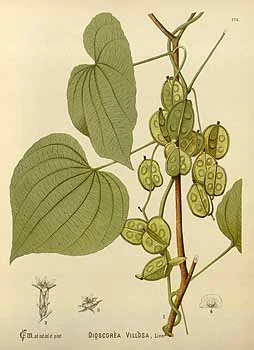“Wild Yam”

Used to make the original contraceptive pills when synthetic hormone production was not a commercial proposition, Wild Yam contains hormonal substances very similar to progesterone. Diosgenin is the raw material originally used to produce progesterone in laboratories.
This herb also relaxes smooth muscle, which is why another common name given is ‘Colic Root’. It is specific for twisting, boring and spastic pain in smooth muscle.
Botanical Name: Dioscorea villosa
Common name: Wild Yam, Colic Root, Rheumatism Root
Family: Dioscoreaceae
Parts Used: Root and hizome
Active Constituents:
- Diosgenin (Although diosgenin can be converted to DHEA and other steroid compound in a laboratory, conversion does not occur in the human body)
- Dioscin
- Dioscorin
- Alkaloids
- Phytosterol
- Resin
- Saponin glycosides
- Steroidal saponins
- Tannins
- Phytosterols
- Starch
- Catechin, chlorogenic acid, proanthocyanadin and anthocyanidin (antioxidant)
Qualities: Cold, sweet, neutral, generally drying, and bitter (Ody)
“…wild yams contain diosgenin, a precursor in the synthesis of progesterone, and are the only known available source” – Rudolf Weiss, 1985
Actions:
- Spasmolytic – smooth muscle relaxant
- Anti-inflammatory
- Antirheumatic
- Estrogen modulating (enhance oestradiol binding to oestrogen receptors and induce transcription activity in oestrogen-responsive cells)
- Stomachic
- Promotes bile flow
- Diaphoretic
Indications:
- GIT spasm – colic pains, diverticulitis, cholecystitis
- Pancreatitis – Wild Yam is a traditional herbal medicine for digestive spasms and inflammation and contains diosgenin which is shown to prevent pancreatic cell death in animal models of acute pancreatitis (Stansbury)
- Can reduce stomach acid while enhancing gastrointestinal motility (Stansbury)
- Bilious colic
- Uterine or ovarian cramping
- Dysmenhorroea
- Nausea of pregnancy / menopausal symptoms
- Rheumatism
- Tonic for uterus and hormones
- PMS cramping
- Specific: BHP – bilious colic, acute RA
Traditionally indicated for twisting, boring and spastic pain in smooth muscle.
Contraindications: None known
Cautions: Generally considered safe in pregnancy when consumed in low doses. May be taken during labour
Dosage: 20-40ml 1:2 per week 6-12 gm per day dry
May take 6 to 12 weeks to show effects
Combinations:
- Decoct with Willow Bark for arthritic pains
- Combine with Celery Seed, Angelica, Meadowsweet or Willow Bark for acute stages of RA
OTHER USES:
- DECOCTION: Used for colic pains associated with IBS or diverticulosis. Can also be used for period pain or during labour.
- TINCTURE: Take 5-10 drops as required for labour or post partum pains.
References & Links to Articles:
Ody, Penelope (1998). The Herb Society’s Complete Medicinal Herbal. Milan: Dorling Kindersley

